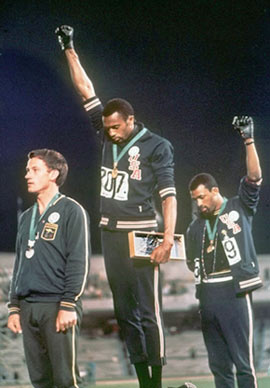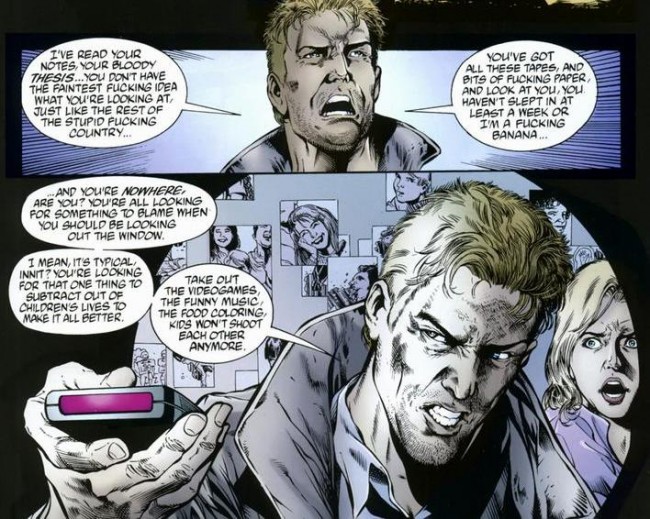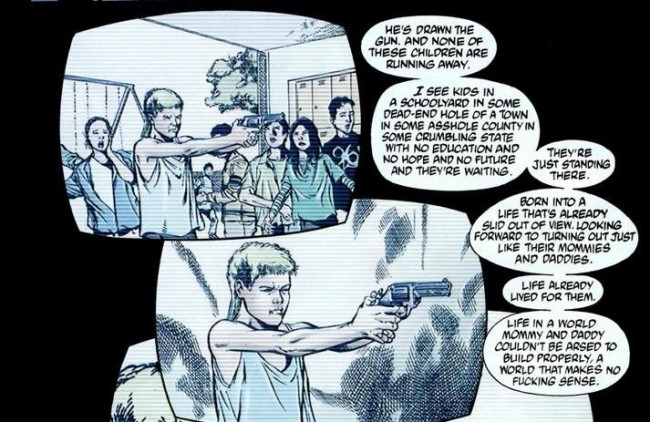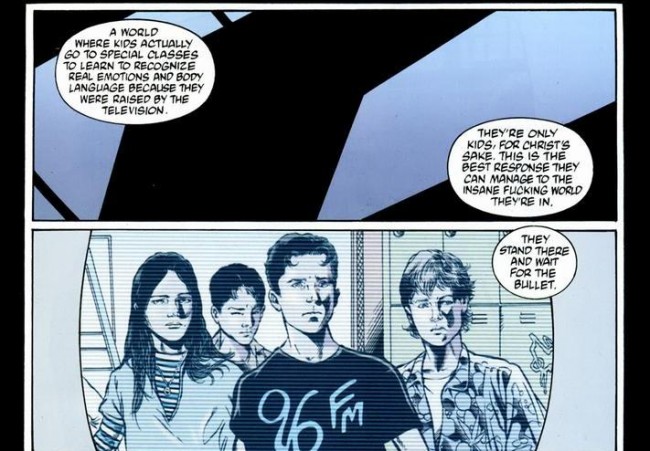There’s a line from the Atmosphere song “Always Coming Back Home To You” that I like and reference probably too often for my own good. “I swear to God, hip-hop and comic books were my genesis.” It was true when I first heard it and it’s still true. Rap and comics have been two of the handful of constants in my life so far. It isn’t exactly a question of which one I like more. It’s more that both have had different effects on my life.
Comics helped a lot in teaching me to read. Obscure science terms, made-up words, and things that sounded like made-up words but were actually real words after all littered my early comics reading experience. So, comics taught me a love of words.
Rap taught me to love wordplay. It’s about taking a phrase you know and turning it on its head. High School Me would hate me for being about to quote Young Jeezy, but this part from his verse on Put On is great and he’s from the next town over, so suck it, 2001-me.
Passenger’s a red bone, her weave look like some curly fries
Inside’s fish sticks, outside’s tartar sauce
Pocket full of cel-e-ry, imagine what she telling me
Blowing on asparagus, the realest shit I ever smoked
Ridin’ to that trap or die- the realest shit I ever wrote
They know I got that bro-cco-li, so I keep that glock with me
And yeah, it’s typical ignant thug rap– this is still Jeezy, after all. He makes the extended food metaphor work, and for some reason, it ends up being pretty clever. There are other great examples. Big Pun had that killer tongue-twister flow (Dead in the middle of little Italy, little did we know that we riddled some middleman who didn’t do diddly) and Ghostface is still rap’s very own Gabriel Garcia Marquez.
Another place where rap and comics intersected for me was in that they both portrayed heroes and role models for a very young David Brothers to take in. The difference between the two is that comics had heroes, black or white, who were generally written for white guys by white guys, while rappers were generally black guys who were usually aimed at a black audience.
The majority of black comics characters were, for years, either black characters filtered through an extremely non-black lens (Storm), unrelateable (Panther), parodies (Cage), or awful (Bishop).
Rap offered a slightly different perspective. I was just old enough to sneak in on the tail end of the pro-black movement of rap. Midnight Marauders hit when I was nine or ten (along with the Malcolm X movie). I had the Wu. I had Nas. I had a ton of people who taught me that being black is awesome, having money is great, and that crime is exciting. When it came down to choosing Iron Man or Tony Starks… I went with Ghostface Killah.
Most comics, with the notable exception of Milestone and occasional “outreach” books, aren’t aimed at me. That’s changed somewhat in recent years, but Marvel and DC are still relying on the same fanbase they’ve had for forty-plus years.
This brings me around to what I think are the two most important books in comics since… I dunno, the Jemas-era began. Nat Turner by Kyle Baker, and Sentences by Percy “MF Grimm” Carey and Ron Wimberly are books that are aimed at me. They’re by black people and aimed, if not at black people directly, at a wider audience than just “fanboys.”
Both aren’t necessarily the most marketable “comic books.” One is a book about a guy whose claim to fame was killing a lot of white men, women, and children after he was given a sign from Heaven. The other is about a rapper, but the greater message isn’t about “bitches and switches and hoes and clothes and weed,” which is what you’d usually see out of basically anything involving rap in the media at large.
Sentences was probably my favorite complete book out of ’07, including single issues, and it totally got robbed for that Eisner. I think it’s an important step in a lot of ways, and the least Vertigo-style title Vertigo has published. It isn’t a long and boring, goth-y, about vampires, religion, or your usual Vertigo cliche of choice. It’s just about a dude, his life, and the choices he made that got him to where he is now. It’s also about growing up black, falling into traps, and digging your way out of a hole you’ve dug for yourself.
There were any number of scenes and references in that book that I immediately got. I thought the bit with the mom in the beginning was hilarious. Why? Probably because I’d seen my mom swing on a grown man for messing with my little brother and any number of verbal sonnings while out shopping. I can relate to Carey’s love for his grandmother because we’re on the same level there.
In a very real way, it’s a book about me and my experiences. It’s about someone who looks like me, has gone through some of the same things I’ve gone through, listens to the same music, and even hung out with some of my own heroes. I don’t have to play down the obvious racial and class differences between me and most comics characters. I don’t have to worry about shocked stares when I say I haven’t heard of some apparently huge band. It’s the power of shared experience working in my favor. I finished the book feeling like I could go “Midnight Marauders or Low End Theory?” and “Ether or Takeover?” and get into an hour-long fight or an hour-long conversation, depending on the answer.
(Midnight Marauders and Ether are the right answers.)
Kyle Baker’s Nat Turner was my Sentences for when it came out. I recently re-read it on a long plane ride few weeks back, and finishing it prompted a few things. First, it made me realize that I had to do this essay. Second, I resolved to give the book (which I had just purchased a few days earlier) away the first chance I got, because people need to read it. And I did.
Nat Turner, the person, has been an interesting figure to me since I first heard of him. It could have been from a rap song, or from one of the footnotes in a school textbook that Baker mentions in his text pieces in the book. I know (off the top of my head) that he was mentioned on Wu-Forever, Sean Price’s Brokest Rapper You Know, and the Talib Kweli + dead prez joint off Lyricist Lounge.
Nat’s claim to fame, and I’m not embellishing anything here, is that he killed fifty-plus white men, women, and children. He led the largest slave rebellion in the States. Obviously, he was a murderer, and that isn’t something to be proud of. At the same time, though, he stood up tall and spat in the face of a system and country that believed him to be less than human. There’s a lot to appreciate in this story, though that probably makes me sound like a sociopath.
Baker’s approach to the book gives it a storybook kind of feel. There are only a few word balloons, leaving the action to stand on its own. The majority of the text is taken directly from The Confessions of Nat Turner. It comes in chunks and often relates to the scenes being depicted on the page, but its tone is jarring. The rebellion happened 160-some years ago, so the language and times are different. It’s like peeking into another world, or reading about a faraway land. The essay is very methodical and sometimes stilted. Premediated is an apt description, as well.
The art sells every emotion and scene perfectly. Sadness, determination, hate, and love all come through clear as a bell. One scene expertly shows a situation in which killing your own child is the greatest act of love you can perform. It’s depressing, it’s tough, and it’s a downer, but it’s a necessary one. It’s like medicine. You have to take it, and after you get past the taste, you’ll feel better.
I feel like it’s a book you should have to read at least once. It tells a story that doesn’t get a lot of attention, but is still well-known and loved by a lot of people. It’s a story that illuminates both universal rights and what happens when someone is pushed too far and too hard.
Nat Turner and Sentences were like comics dipping their toe into the pool. They were warning shots. They are saying “We are here, we have always been here” to the industry and “Don’t go anywhere, there is something here for you, too” to the audience. I really wish that these books had been around for when I was younger. They’re exactly what I was looking for, but didn’t know I was looking for.
It was the equivalent of one of my favorite images from the past.

“We are here.”
Now, though, I just want more. My two loves are on speaking terms. Let’s keep at it, yeah?







